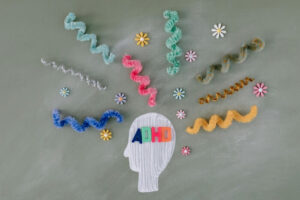Receiving an ADHD diagnosis can bring about a range of thoughts and feelings. Occasionally, clients will say they feel a deep sense of shame about having difficulties or a diagnosis. Others feel confused or surprised at the outcome of an assessment. Most people express huge relief about being able to put a name to their symptoms and struggles and are excited to figure it out. Regardless of your reaction, understanding yourself better is a good thing. Knowing more may help you stop blaming yourself for things that are genuinely difficult for you, lean into your strengths, and put new tools in place to help you thrive.
Step 1: Understand that ADHD Is a Neurotype, Not a Character Flaw
The number one thing I hear in my office from people with ADHD is, “I’m scared people think I’m lazy”, and it is my honor to let them know ADHD is not a choice, a character flaw, or a lack of willpower. So do people with ADHD behave in lazy ways? Sure! We all do sometimes, but I’ve found that people with ADHD actually tend to be really hard workers. However, due to their neurodivergence, their efforts often just aren’t as effective as they’d like them to be. That leads to a lot of frustration and – sometimes – a shut down or stall out in their efforts over time.
ADHD is a neurodevelopmental condition that affects the brain’s executive functions. Executive functions are a set of cognitive processes that include self awareness and emotional regulation, time management, organization, and impulse control, amongst others. Executive functions develop over time in all people and more slowly in people with ADHD.
According to the Effective U program at the University of Minnesota, “Self awareness is the foundation of all other executive function skills. People with ADHD often have brains that move very quickly, which can lead to lower levels of self awareness” due to not stopping to think through decisions fully (Effective U, 2025.) The good news is that with a more conscious effort, anyone struggling with this can learn to slow down and observe their thoughts and feelings so that they increase their self awareness and, in time, further develop the other skills as well.
Image source: Effective U, University of Minnesota
Step 2: Self Acceptance
It’s common for people with a recent ADHD diagnosis to feel a mix of emotions. You might feel relief, but you could also experience a sense of grief over all the time you struggled without knowing why. It’s possible that you’ve spent years – perhaps decades – feeling misunderstood or frustrated with yourself. A diagnosis can bring up feelings of regret for difficulties in your lived experience that could have been avoided with earlier intervention.
To help balance those emotions, it is also important to look at all of the benefits of your neurotype. For example, ADHD can allow for amazing traits like high creativity, adaptability, and excellent problem-solving abilities. People with ADHD have a remarkable ability to think outside of the box and shine light on opportunities others might not see. Working toward acceptance of self and building self esteem so you can really utilize these strengths is the key.
Step 3: Put Together a Support System
So how do you learn to do all of this? First admit that managing daily life with ADHD effectively is often not a one-person job for the newly diagnosed. It is most helpful to take a collaborative approach to better treat symptoms and build skills that help you feel successful each day. A treatment team can include a combination of professionals like therapists, coaches, and prescribers as well as a personal support system.
Medication Management
A primary care doctor is often the first point of contact in an ADHD treatment journey, especially if your relationship with them is longstanding as they may know your health history best. They can review symptomology, rule out other potential medical causes for symptoms and impairments, and then make recommendations for assessment and psychiatric confirmation. Once a diagnosis has been made, medication management may become part of the conversation. There are various types of medications that help manage ADHD symptoms; your doctor can prescribe and monitor effectiveness, manage side effects, and adjust dosages as needed while you find the right one for you. If you have co-occurring mental health conditions, a specialist psychiatrist is the best type of doctor to see for ongoing medication management.
Therapy
A therapist or counselor trained in ADHD and executive functions can be an invaluable part of your treatment team. While medication helps with symptom management, therapy addresses the psychological, emotional, and behavioral aspects of ADHD. Helping clients cope with challenges, develop their executive functions, build self esteem and lean into their strengths more effectively is the role of a therapist.
In general, therapy holds space for processing emotional responses. Emotional regulation and reducing impulsivity is often a significant part of ADHD treatment. A therapist can help you explore your background and family history and the emotions tied to your sense of self. In therapy, you may develop strategies for managing intense feelings like frustration, anger, or anxiety, which may arise from day-to-day or lifelong struggles.
Mindfulness is helpful for people with ADHD as it puts emphasis on being right here, right now with intention, and learning to listen more closely to yourself. A therapist who specializes in mindfulness can help you identify ways that your natural openness to new experiences and spontaneity can work for you without sabotaging your goals. The idea of therapy is not to change who you are; rather, the goal is to help you know yourself more and slow down enough to make intentional choices and actions.
Cognitive Behavioral Therapy (CBT) is a structured, goal-oriented therapy that helps individuals identify negative thinking patterns and replace them with more rational ways of thinking and behaving. CBT goals can focus on the majority of struggles for people with ADHD, which includes executive functioning development with tasks like improving organizational skills, time management and time blindness, difficulties in memory and problem-solving, which are often key struggles for people with ADHD. Group CBT therapy with a particular focus on ADHD is also beneficial as it is helpful to practice skills with other group members who get it while under the guidance of a specialized therapist.
It is powerful to feel emotionally supported while you build helpful structure into your life. See our other Sentier blog entitled “ADHD Fundamentals: Understanding the Diagnosis” for additional examples of tools and strategies therapists can help you develop.

ADHD Coaching
Some therapists are also ADHD coaches, and ADHD coaches are also available outside of the therapy setting. Unlike talk therapy that gets at the underlying emotional and psychological elements, ADHD coaching is very behavioral, action-focused, and skills-based. An ADHD coach helps a client implement strategies to manage day-to-day tasks. Coaching involves setting goals and accountability that may take place via meetings, calls, and hands-on involvement in client lifestyle.
Occupational Therapy
If your ADHD symptoms significantly impact your ability to perform daily tasks or function in specific environments, such as at work or school, consider seeking Occupational Therapy (OT). OTs specialize in helping individuals develop the skills needed to carry out everyday activities efficiently and comfortably. Some individuals with ADHD also have sensory processing issues (earlier diagnosis is better, though not necessary, here). Heightened sensitivity means you may feel the world in very intense ways, which can lead to higher levels of distraction or avoidance of certain environments. OTs can help you develop strategies to manage sensory overload when the world around you feels like too much.
School and Workplace Advocates
Not everyone with ADHD struggles at school or work, but it is important to know that ADHD is a protected health disability under the Americans with Disabilities Act. This means that your workspace or learning environment is required to provide reasonable and appropriate accommodations to meet your ADHD needs. The goal of any accommodation is to help you achieve equitable access to learning and success within your school or workplace environment. In a school, the person likely to provide advocacy for accommodations is the school social worker or special education department. At work, a Human Resources (HR) officer or your direct manager can help you look into supportive accommodations. As a starting point, you will likely need to provide documentation of your diagnosis of ADHD as well as think about what accommodations would allow you to feel more successful.
disability under the Americans with Disabilities Act. This means that your workspace or learning environment is required to provide reasonable and appropriate accommodations to meet your ADHD needs. The goal of any accommodation is to help you achieve equitable access to learning and success within your school or workplace environment. In a school, the person likely to provide advocacy for accommodations is the school social worker or special education department. At work, a Human Resources (HR) officer or your direct manager can help you look into supportive accommodations. As a starting point, you will likely need to provide documentation of your diagnosis of ADHD as well as think about what accommodations would allow you to feel more successful.
Peer Support
While any combination of the above-described professionals can make up a treatment team, it’s equally important to have a network of peers who understand what you’re going through. ADHD support groups and peer mentors offer camaraderie and advice that can help you say, “I’m not alone in this.” ADHD support groups provide a sense of solidarity, shared coping strategies, and space for you to discuss struggles in a non-judgmental environment. Similarly, a peer mentor is someone who has been managing ADHD for a longer time than you and can offer guidance based on personal experience. A peer mentor can help you understand what worked for them, offer advice, and reassure you that you’re not alone on this journey. The CHADD directory is a great place to start looking for peer support near you.
Family and Friends
Finally, your family and close friends are also integral to better living with ADHD. It is common for folks with ADHD to report some relational distress related to ADHD symptoms (e.g. the common statement about “People think I’m lazy…”) People with ADHD often report that they have spent a lot of time in their lives getting by with things or trying not to let others see their difficulties. It may then seem counterintuitive, but it is very important for your loved ones, including those with neurotypical brains, to understand that you have ADHD, what it is, and how it affects you. The more people hear it from you honestly, the more you can reduce misunderstandings and open new pathways that support the health of your relationships and each individual within the relationships.
to report some relational distress related to ADHD symptoms (e.g. the common statement about “People think I’m lazy…”) People with ADHD often report that they have spent a lot of time in their lives getting by with things or trying not to let others see their difficulties. It may then seem counterintuitive, but it is very important for your loved ones, including those with neurotypical brains, to understand that you have ADHD, what it is, and how it affects you. The more people hear it from you honestly, the more you can reduce misunderstandings and open new pathways that support the health of your relationships and each individual within the relationships.
Household members, especially partners and the parents of children with ADHD, can also be part of creating and maintaining the new routines you are working on in therapy. They can assist in managing tasks, giving reminders, and providing encouragement. Don’t be afraid to ask for help – you are worth it!
Conclusion
As we have identified, perspective is everything when it comes to seeing ADHD as a neurotype with many strengths. A diagnosis of ADHD can allow you to live and thrive with it rather than feeling limited by symptoms that have gone misunderstood. A collaborative approach can help you feel equipped to take small, steady steps toward understanding your needs and building a structured, supportive lifestyle for thriving.
Blog written by therapist and Education Manager at Sentier Psychotherapy, Sarah Souder Johnson.
Sources:
ADHD Executive Functioning | Effective U. (2025). Umn.edu. https://effectiveu.umn.edu/academics/adhd-executive-functioning/adhd-executive-functioning
CHADD Affiliate Locator – Find a local ADHD support group in your area. (n.d.). CHADD. https://chadd.org/affiliate-locator/
Team, A. E. (2023, July 7). ADHD Workplace Accommodations. ADDA – Attention Deficit Disorder Association. https://add.org/adhd-workplace-accommodations/
What Is Executive Function? 7 Deficits Tied to ADHD. (2015, January 14). ADDitude. https://www.additudemag.com/7-executive-function-deficits-linked-to-adhd/?srsltid=AfmBOoq3QIXhCqif3VTF8mmUtA00qOK82-8K7jF15oj6qqkeESWLXldq





